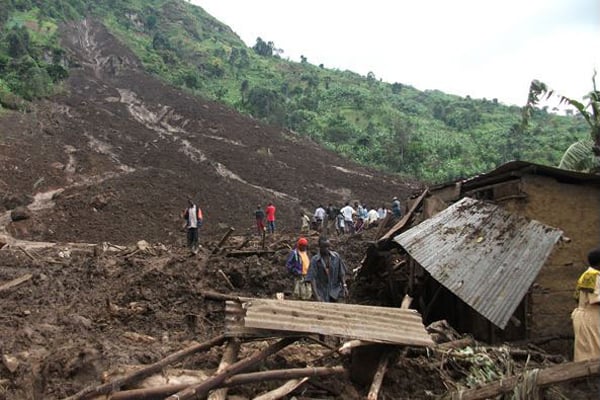UK pledges Shs56 trillion for climate change

Some of the residents of Bududa District who were affected by mudslides that killed 40 people in 2018. PHOTO/FILE
What you need to know:
- Challenge to finances.“Some of the things we are seeing already with changes in rainfall, droughts or floods, and landslides are quite new. So there is not a background or they have not been keeping data over a long period in some of these issues. This is one of the reasons why projects often fail to get the financing,” Janet Rogan, UK COP26 regional ambassador for Africa and Middle East
The United Kingdom has committed £11.6 billion (Shs56.5 trillion) for the next five years to mitigate the impact of climate change, adaptation and a number of climate-related projects, especially in developing countries, including Uganda.
The funds are part of the 2015 Parish Agreement where global powers promised to make up to $100b (Shs357 trillion ) available annually to combat climate change and its impacts.
Ms Janet Rogan, the UK COP26 regional ambassador for Africa and Middle East, said UK, which is chairing the COP26, has made the commitment ahead of the conference, and has encouraged other developed countries to fulfil their obligations.
“Our Prime Minister (Boris Johnson) has pledged to double the amount of finance that is available for climate to £11.6b over the next five years. So we have doubled our contribution. We are also encouraging all of the OECD (Organisation for Economic Co-operation and Development) countries to increase the level [of financing] so that we reach that $100 billion target every year for the developing countries,” she said at the weekend.
Ms Rogan said developed countries have contributed about $80b (Shs286 trillion) , a figure which has remained stagnant for the last five years.
“So we need more effort and we are pushing very hard up until the last minute and even at the conference to make sure people live up to that $100b. We promised to do that in Paris in 2015 and we have to keep our word,” she said.
Ms Rogan also said the process of accessing the funds, especially for developing countries is still a challenge due to bureaucracy.
“Even when we are making that finances available, it is really difficult to access it. The project proposals, the applications are very heavy, it can take maybe two or three years for one application by a government. And it takes a lot of capacity to pull all of the technical elements,” she said.
Ms Rogan also cited absence of good data in many countries on climate issues.
However, the UK official said her country has set up a taskforce to assess the problem.
“We are putting more into adaptation projects, not only mitigation ones,” Ms Rogan added.
Ms Kate Airey, the British High Commissioner to Uganda, said the UK government is supporting initiatives that ensure action is taken at a community level.
“We believe that you need to have several vehicles to enable local action. One is private sector, and the other is community level, then at local government level and finally at national level. So we are looking at supporting communities to access finance,” she said.
Initiatives taken
For instance, British High Commission in Uganda is engaged in tree planting in Bududa District, an area that has faced mudslides.
Ms Airey said they have also established a climate finance forum aimed at working with international donors and acting as a coordination point across different ministries.
“Often, we find that in countries, climate action sets within one ministry, often the ministry of environment, yet this is an issue that affects all ministries. So we are bringing together a range of costs across ministry actors to make sure that we are listening, and we understand Uganda’s climate priorities,” she said.



